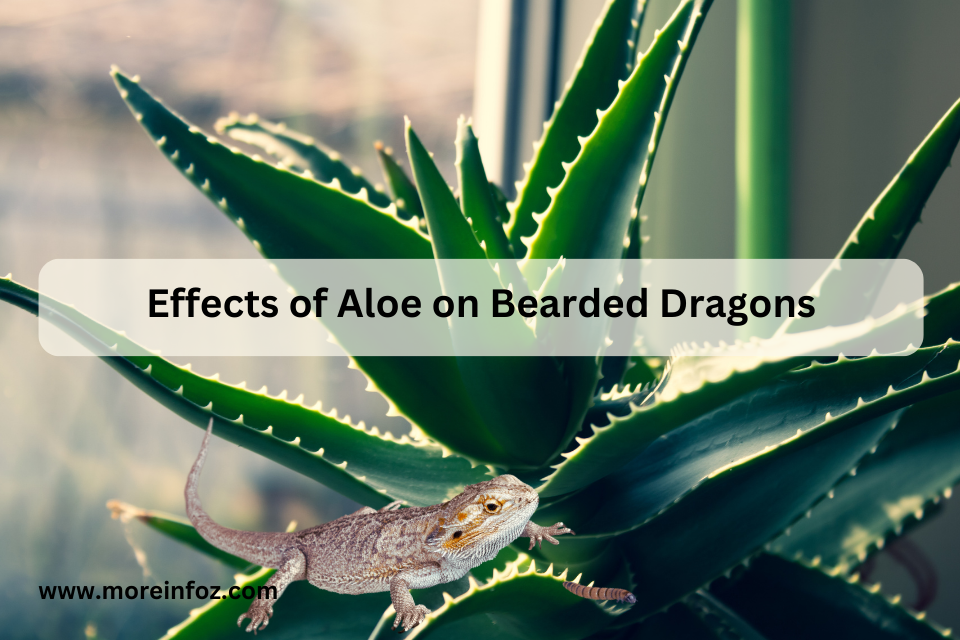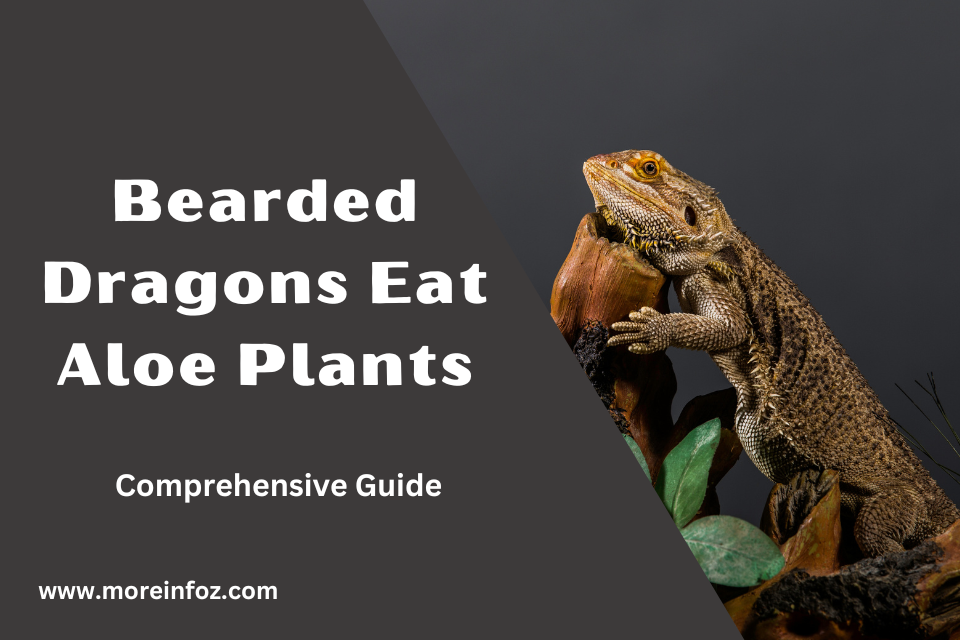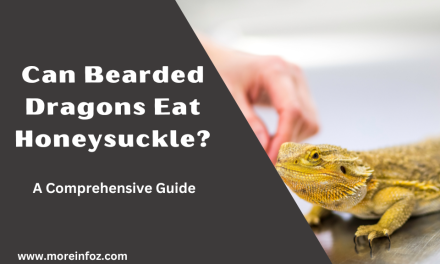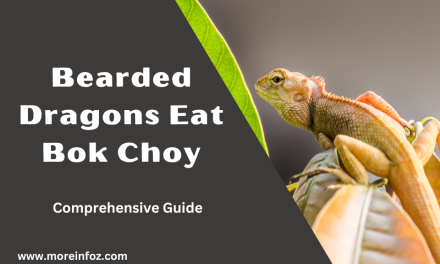Bearded dragons are a popular pet reptile due to their docile nature and easy care requirements. As with any pet, it is important to ensure that they are receiving a balanced and nutritious diet. Many owners wonder if aloe plants can be included in their bearded dragon’s diet.
Aloe plants are known for their medicinal properties and are often used in skincare products. However, when it comes to feeding them to your bearded dragon, caution is advised. While aloe plants are not toxic to bearded dragons, they can cause digestive issues if consumed in large quantities. It is important to note that bearded dragons are omnivores and require a balanced diet of insects, vegetables, and fruits.
Understanding Bearded Dragons’ Diet
Bearded dragons are omnivores, which means they eat both plants and animals. In the wild, their diet consists mainly of insects, but they also eat a variety of vegetation.
When it comes to feeding your pet bearded dragon, it’s important to provide a balanced diet that meets their nutritional needs. This means offering a mix of protein, fiber, vitamins, and minerals.
Here are some key things to keep in mind when it comes to feeding your bearded dragon:
- Protein: Bearded dragons need plenty of protein to support their growth and development. Offer a variety of insects such as crickets, mealworms, and dubia roaches.
- Vegetables: Bearded dragons also need fiber and other nutrients found in vegetables. Offer a mix of leafy greens, such as kale and collard greens, as well as other veggies like carrots and squash.
- Fruits: While fruits should be offered in moderation, they can provide a source of vitamins and minerals. Offer small amounts of fruits like strawberries and blueberries.
- Calcium: Bearded dragons need calcium to support their bones and overall health. Offer calcium supplements or dust their food with calcium powder.
- Water: Make sure your bearded dragon always has access to clean, fresh water. You can offer water in a shallow dish or use a spray bottle to mist their enclosure.
It’s important to note that not all plants are safe for bearded dragons to eat. Aloe plants, for example, can be toxic and should be avoided. Always do your research before offering any new food to your bearded dragon.
Can Bearded Dragons Eat Aloe Plants
Aloe plants are a popular houseplant known for their medicinal properties. However, when it comes to feeding a bearded dragon, it is important to know whether or not they can safely consume aloe plants. In this section, we will explore whether or not aloe plants are suitable for bearded dragons to eat.
First and foremost, it is important to note that aloe plants are not toxic to bearded dragons. However, they are not recommended as a regular part of their diet. Aloe plants contain saponins, which can cause gastrointestinal upset in bearded dragons if consumed in large quantities.
Additionally, aloe plants do not provide any nutritional value to bearded dragons. They are low in protein, calcium, and other essential nutrients that bearded dragons need to thrive. Therefore, it is recommended to avoid feeding aloe plants to bearded dragons on a regular basis.
If you do decide to feed your bearded dragon aloe plants, make sure to do so in moderation. Offer small amounts as an occasional treat and monitor your bearded dragon for any signs of gastrointestinal upset.
In conclusion, while aloe plants are not toxic to bearded dragons, they should not be a regular part of their diet. It is important to provide your bearded dragon with a balanced and nutritious diet that meets their specific dietary needs.
Effects of Aloe on Bearded Dragons

Digestive Impact
Aloe plants contain aloin, which is a substance that can cause digestive issues in bearded dragons. Aloin can irritate the digestive tract and cause diarrhea, vomiting, and dehydration. These symptoms can be particularly dangerous for bearded dragons, as they can quickly lead to severe health problems.
If a bearded dragon ingests a small amount of aloe, it may not experience any adverse effects. However, if it consumes a significant amount, it can lead to serious health issues. It’s essential to monitor your bearded dragon’s behavior and health closely if you suspect it has ingested aloe.
Potential Toxicity
While aloe plants are not generally considered toxic to bearded dragons, they can still be harmful. In addition to digestive issues, aloin can also cause kidney damage and other health problems if ingested in large quantities.
It’s important to note that not all aloe plants are the same. Different species and varieties of aloe can have varying levels of aloin. Some aloe plants may be less harmful to bearded dragons than others. However, it’s best to err on the side of caution and avoid feeding your bearded dragon any aloe plants.
In conclusion, while aloe plants may not be toxic to bearded dragons, they can still be harmful. Aloin can cause digestive issues and other health problems if ingested in large quantities. It’s best to avoid feeding your bearded dragon any aloe plants and to monitor its behavior and health closely if you suspect it has ingested any.
Safe Plants for Bearded Dragons
As responsible pet owners, we want to provide our bearded dragons with a healthy and varied diet. While we know that vegetables and fruits are important components of their diet, we may wonder about the safety of feeding them plants that are not commonly found in their diet. In this section, we will discuss some safe plants for bearded dragons.
Leafy Greens
Leafy greens are an excellent source of vitamins and minerals for bearded dragons. They are also low in oxalates, which can bind calcium and prevent its absorption. Some safe leafy greens for bearded dragons include:
- Collard greens
- Dandelion greens
- Mustard greens
- Turnip greens
- Endive
- Escarole
- Kale
- Swiss chard
Vegetables
Vegetables are another important component of a bearded dragon’s diet. Some safe vegetables for bearded dragons include:
- Squash (acorn, butternut, spaghetti)
- Carrots
- Bell peppers
- Cucumbers
- Zucchini
- Sweet potato
- Pumpkin
- Green beans
Fruits
Fruits should be fed in moderation, as they are high in sugar. Some safe fruits for bearded dragons include:
- Apples (without seeds)
- Berries (strawberries, blueberries, raspberries)
- Mango
- Papaya
- Melons (watermelon, cantaloupe)
Herbs
Herbs can add flavor and variety to a bearded dragon’s diet. Some safe herbs for bearded dragons include:
- Basil
- Cilantro
- Mint
- Oregano
- Parsley
- Rosemary
- Sage
- Thyme
It is important to note that not all plants are safe for bearded dragons. Some plants can be toxic and can cause serious health problems. Always research before feeding any new plant to your bearded dragon and consult with a veterinarian if you have any concerns.
Conclusion
After conducting extensive research on the topic of whether bearded dragons can eat aloe plants, we have come to a few conclusions.
Firstly, while aloe plants are not toxic to bearded dragons, they should not be a regular part of their diet. Aloe plants contain high levels of aloin, which can cause diarrhea and dehydration in bearded dragons if consumed in large amounts.
Secondly, if you do choose to feed your bearded dragon aloe as an occasional treat, it is important to prepare it properly. The outer layer of the aloe leaf contains a bitter sap that can be harmful to your pet. To remove this layer, you should soak the aloe in water for at least 24 hours before feeding it to your bearded dragon.
Finally, it is important to remember that bearded dragons require a balanced and varied diet to stay healthy. Aloe plants should never be a substitute for the insects and vegetables that make up the majority of their diet.
In summary, while bearded dragons can eat aloe plants in moderation, it is not recommended as a regular part of their diet. As with any new food, it is important to introduce aloe slowly and monitor your pet for any adverse reactions.
Frequently Asked Questions
What plants are safe for bearded dragons to eat?
Bearded dragons are omnivores and can eat a variety of plants. Some safe options include collard greens, mustard greens, turnip greens, dandelion greens, and butternut squash. It is important to provide a variety of greens to ensure a balanced diet.
What are some wild plants that bearded dragons can eat?
Bearded dragons can eat a variety of wild plants such as clover, plantain, and chickweed. However, it is important to ensure that the plants have not been exposed to pesticides or other harmful chemicals.
What types of succulents can bearded dragons eat?
Succulents such as aloe vera and hens and chicks are safe for bearded dragons to eat in small amounts. However, it is important to remove the spines and thorns before feeding them to your bearded dragon.
Which flowers are safe for bearded dragons to eat?
Bearded dragons can eat a variety of flowers such as hibiscus, pansies, and calendula. However, it is important to ensure that the flowers have not been exposed to pesticides or other harmful chemicals.
Are jade plants safe for bearded dragons to eat?
No, jade plants are toxic to bearded dragons and should not be fed to them.
What plants are poisonous to bearded dragons?
Some plants that are toxic to bearded dragons include avocado, rhubarb, and ivy. It is important to research any new plants before feeding them to your bearded dragon.





